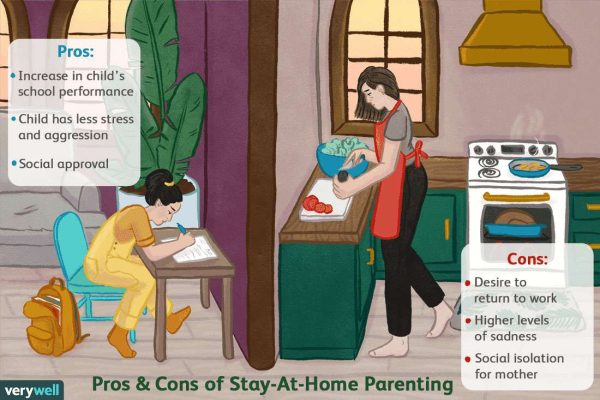You’ve just embarked on the incredible journey of motherhood, and now the question lingers in your mind: how long should you stay home with your precious little one?
This decision is indeed a pivotal one, as it involves balancing your aspirations with the needs and development of your baby.
In this article, we will explore the various factors to consider when determining the ideal duration for your maternity leave, considering both your desires and the importance of nurturing your baby during those crucial early months. So, please grab a cup of tea, sit back, and let’s find the perfect balance together.
Review contents
1. Factors to Consider
Several essential factors must be considered when deciding how long a mother should stay home with her baby. These factors can significantly influence the decision-making process and determine the best action for the mother and the baby.
1.1 Maternity Leave Policy
One of the first factors to consider is the maternity leave policy. This policy varies depending on the country, company, or organization. Some countries offer generous maternity leave benefits, allowing mothers to take extended time off work with full or partial pay. On the other hand, some companies may only offer a short duration of maternity leave or no paid leave at all. Understanding the maternity leave policy in your situation is crucial in determining how long you can afford to stay home with your baby.
1.2 Financial Situation
Your financial situation is another significant consideration when deciding how long to stay home with your baby. Taking time off work can significantly impact your income, and it’s essential to assess your family’s financial stability during this period. Considering factors such as necessary expenses, savings, and potential sources of financial support can help you make an informed decision about the duration of your time away from work.
1.3 Support System
The presence of a support system plays a vital role in a mother’s ability to stay home with her baby. Having a partner, family members, friends, or others who can provide assistance and emotional support can make the transition into parenthood smoother. Assessing your support system’s availability and willingness to help can help determine how long you can comfortably stay home with your baby.
1.4 Emotional Readiness
Emotional readiness is an often overlooked yet crucial factor when considering how long a mother should stay home with her baby. Adjusting to the responsibilities and demands of caring for a newborn requires a certain level of emotional preparedness. It’s essential to be honest and evaluate whether you feel mentally and emotionally ready for an extended period of full-time caregiving. Seeking support from a therapist or counselor can also be beneficial in navigating the emotional journey of motherhood.
1.5 Career Aspirations
Balancing career aspirations with the desire to stay home with your baby can be a challenging task. Consider your long-term career goals and how taking time away from work may impact your professional development. Depending on your field, staying home with your baby for a more extended period might affect your career trajectory. Evaluating the potential consequences and determining the best balance for your personal and professional life is essential.
1.6 Baby’s Health Needs
Your baby’s health needs can also influence the decision of how long to stay home. Some babies may have specific medical conditions or require specialized care, necessitating a more extended parental presence. Consult with your pediatrician or healthcare provider to understand any specific health considerations for your baby that could impact your time away from work.
1.7 Personal Preference
Ultimately, each mother’s preference significantly determines how long to stay home with her baby. Some mothers may strongly desire to spend as much time as possible with their newborn and choose to extend their leave. Others may feel a stronger pull to return to work or resume their routine earlier. Honoring your preferences and considering what feels suitable for you and your family is essential in making this decision.
1.8 Age of the Baby
Your baby’s age can also affect how long you should stay home. A newborn’s needs differ from those of an infant, toddler, or preschooler. Newborns often require constant care and attention, while older babies and children may be more independent. Evaluating age-related demands and considering your ability to meet those needs is essential when determining the duration of your time away from work.
1.9 Government Regulations
Some countries may have specific government regulations regarding maternity leave and parental rights. Familiarize yourself with the laws and regulations in your country to understand your legal entitlements and any limitations that may exist. This information can guide your decision-making process and clarify the duration of your maternity leave.
1.10 Return to Work Options
Exploring the available return-to-work options is essential in determining how long to stay home with your baby. Some mothers may opt for a phased return, gradually increasing their working hours. Others may consider part-time work or flexible work arrangements for better work-life balance. Investigate the possibilities within your workplace and discuss them with your employer to find a solution that suits your needs.
2. Maternity Leave Options
Understanding the various maternity leave options available can help guide your decision-making process. Maternity leave policies differ across countries and organizations, so knowing the options that apply to your situation is essential.
2.1 Paid Maternity Leave
Paid maternity leave typically provides mothers with a set period off work with full or partial pay. The duration of paid maternity leave varies significantly depending on the country or company’s policies. Some countries offer several months of paid leave, while others may provide just a few weeks. Research the specific regulations and policies in your country or organization to determine the available paid maternity leave options.
2.2 Unpaid Maternity Leave
Unpaid maternity leave is an option for mothers who do not have access to paid leave or wish to extend their time at home beyond what is covered by their paid leave. Unpaid leave allows mothers to take time off work without receiving a salary. However, it’s essential to consider the financial implications of unpaid leave and ensure it is financially feasible for your family.
2.3 Shared Parental Leave
Shared parental leave is a relatively new concept that allows parents to take time off work to care for their children. This option promotes gender equality in parenting roles and allows fathers or partners to share the responsibilities and joys of caring for a newborn. Shared parental leave can provide additional flexibility and support, allowing both parents to bond with the baby and contribute to their care.
2.4 Parental Leave Policies by Country
Each country has its own set of parental leave policies and regulations. Some countries, such as Sweden and Norway, are known for their generous parental leave policies, providing parents with extended paid leave. Other countries may offer shorter paid leave, and some may provide only unpaid leave. Research the specific policies in your country to understand the available options and how they align with your needs and preferences.
3. Impact on Finances
Taking time off work to stay home with your baby can have significant financial implications. It’s essential to consider the impact on your finances and plan accordingly to ensure financial stability during this period.
3.1 Budgeting for Reduced Income
During your time away from work, developing a budget that accounts for the reduced income is essential. Evaluate your monthly expenses and identify areas to cut back or adjust. Consider how the loss of your salary will impact your ability to meet your financial obligations and plan accordingly to ensure you can make ends meet.
3.2 Cost of Childcare
If you decide to return to work earlier, the cost of childcare is another financial consideration. Research the cost of childcare in your area and factor it into your budget. Compare the expenses of external childcare providers to the potential loss of income if you stay home with your baby. This comparison can help you decide on the financial feasibility of returning to work earlier versus extending your time at home.
3.3 Loss of Retirement Savings
Extended periods away from work can also affect your retirement savings. Be aware of any potential impacts on your retirement contributions and evaluate whether you need to make adjustments to ensure the continued growth of your retirement fund. Consider consulting a financial advisor to assess the long-term financial implications of taking time off work.
3.4 Maternity Benefits
Some countries or employers offer additional maternity benefits that can provide financial support during your time away from work. These benefits may include allowances for baby-related expenses, such as diapers or formula, or assistance with medical bills. Research the available maternity benefits in your country or organization to determine if you qualify and how they can help alleviate some of the financial burdens associated with staying home with your baby.
4. Emotional Considerations
Motherhood can bring many emotions, and it’s essential to consider the emotional aspects when deciding how long to stay home with your baby. Prioritizing your emotional well-being and bonding with your baby is crucial for a positive and fulfilling experience.
4.1 Bonding with the Baby
Staying home with your baby can provide essential bonding time between mother and child. A baby’s early months and years are crucial for establishing a strong emotional connection. Consider the importance of this bonding period and how an extended period of caregiving can enhance your relationship with your baby.
4.2 Postpartum Depression
Postpartum depression is a common condition that affects many new mothers. Consider your mental health and whether you have any risk factors for developing postpartum depression. Staying home with your baby may provide additional support if you are at risk or have experienced postpartum depression. Contact healthcare professionals for guidance and support in managing your emotional well-being.
4.3 Separation Anxiety
Separation anxiety is a natural feeling experienced by many mothers when considering returning to work and leaving their baby in someone else’s care. Evaluate your potential level of separation anxiety and how this emotion may impact your ability to continue working. Discuss your concerns with your support system and explore strategies to manage separation anxiety effectively.
4.4 Mental Health Support
Prioritizing your mental health and seeking support when needed is crucial when considering how long to stay home with your baby. Identify potential resources, such as therapists, support groups, or helplines, that can assist in managing motherhood’s emotional challenges. Don’t hesitate to reach out for support if you are struggling emotionally.
5. Support Systems
Having a solid support system is invaluable when navigating the journey of motherhood. Assess the available support systems in your life and how they can contribute to your ability to stay home with your baby.
5.1 Partner’s Involvement
The involvement and support of your partner can significantly influence your decision to stay home with your baby. Discuss your desires, concerns, and available options with your partner to ensure you are both on the same page. Consider the possibility of tag-teaming responsibilities and sharing childcare duties to create a balanced dynamic that allows both of you to be involved in your baby’s life.
5.2 Family Support
The support of family members, such as parents, siblings, or grandparents, can significantly impact your ability to stay home with your baby. Assess the availability and willingness of your family members to assist, whether through occasional babysitting, emotional support or help with household chores. Having trusted family members who can step in and lend a helping hand can make the transition into parenthood smoother.
5.3 Community Resources
Explore the community resources available to new mothers in your area. Look for parent groups, support networks, or childcare services that provide assistance and guidance. Engaging with other new mothers and participating in community activities can help alleviate the feelings of isolation and provide a sense of belonging during this transformative time.
5.4 Workplace Support
Consider the level of support provided by your workplace. Some employers offer programs or initiatives that promote work-life balance and support working parents. Explore the available workplace benefits, such as flexible work arrangements, on-site child care, or breastfeeding facilities. A supportive workplace can significantly impact your ability to balance your professional and personal life.
6. Balancing Career Aspirations
Finding the right balance between your career aspirations and the desire to stay home with your baby is a common challenge for working mothers. Consider the implications of your decision on your long-term career goals and evaluate the options for maintaining a fulfilling professional life.
6.1 Career Impact
Taking an extended period away from work can potentially impact your career trajectory. Some industries may be more sensitive to career gaps than others, so evaluating how your profession views extended leaves is essential. Consider the consequences and how a break from work may affect your resume or future job prospects. Weigh the pros and cons of taking time off against your long-term career aspirations.
6.2 Parent-Friendly Work Environment
A parent-friendly work environment can significantly impact a mother’s ability to balance work and family life. Consider the culture and policies of your workplace and assess whether they align with your needs as a working mother. Companies with flexible work arrangements, supportive management, and family-friendly policies can provide a conducive environment for mothers to navigate their professional and personal responsibilities.
6.3 Flexible Work Options
Exploring flexible work options can provide an alternative solution to staying home full-time or returning to work on a traditional schedule. Consider the feasibility of part-time work, job-sharing, or working from home. Discuss these possibilities with your employer and explore whether they can accommodate your needs. Flexible work options can allow for a better work-life balance and ensure you can continue professional development while being present for your baby.
6.4 Career Development during Maternity Leave
While on maternity leave, there may be opportunities for career development and professional growth. Consider whether you can use this time to upskill, attend workshops or conferences, or engage in networking activities. Staying connected to your professional field during your maternity leave can help ensure a smoother reintegration into the workforce when you decide to return.
7. Baby’s Health Needs
The specific health needs of your baby can play a significant role in determining how long to stay home. Consider any medical conditions, feeding requirements, or developmental milestones requiring additional caregiving or attention.
7.1 Medical Conditions
If your baby has any specific medical conditions or health concerns, it may necessitate a more extended parental presence. Discuss these conditions with your healthcare provider and consider how they may impact your ability to return to work. Prioritizing your baby’s health needs is essential when deciding the duration of your time away from work.
7.2 Breastfeeding
Breastfeeding is essential to infant care, and many mothers want to continue breastfeeding for as long as possible. Consider the impact of returning to work on your ability to breastfeed. Explore options such as pumping milk, storing milk, or finding childcare providers who support breastfeeding. Balancing your desire to breastfeed with your career aspirations and your baby’s needs is an important consideration.
7.3 Developmental Milestones
Babies go through various developmental milestones during their first year. Consider if you want to be actively involved in these milestones and how your absence from work may affect your ability to witness and participate in them. Reflect on the importance of being present for your baby’s first steps, words, or other significant milestones, and let these considerations guide your decision-making.
7.4 Doctor’s Recommendations
Consult with your pediatrician or healthcare provider to understand their recommendations regarding the duration of your time away from work. Healthcare professionals are knowledgeable about the specific health needs of infants and can guide what is best for your baby’s well-being. Take their advice into account when making decisions about your return to work.
8. Personal Preference
At the heart of this decision lies your personal preference as a mother. Many mothers have an innate desire to care for their babies full-time, while others feel the pull of their careers or other personal goals. Consider your needs and values, and allow these preferences to guide your decision-making process.
8.1 Individual Needs
Each mother has individual needs and desires when staying home with their baby. Consider your needs for self-care, social interaction, personal fulfillment, and mental well-being. Reflect on how staying home with your baby or returning to work can fulfill these needs, and let this self-awareness help shape your decision.
8.2 Work-Life Balance
Work-life balance is a critical consideration for all working parents. Determine how staying home with your baby or returning to work aligns with your desired work-life balance. Reflect on the importance of spending time with your baby, nurturing relationships, and maintaining a satisfying professional life. Finding the right balance can lead to a more fulfilling and satisfying overall experience.
8.3 Maternal Instincts
Trusting your maternal instincts can be a guiding force in determining how long to stay home with your baby. As a mother, you have a unique understanding of your baby’s needs and what is best for your family. Allow your intuition to play a role in your decision-making, trusting you know what suits you and your baby.
9. Age of the Baby
Your baby’s age can influence how long you should stay home, as the needs and demands of babies change as they grow. Consider the different stages of infancy and early childhood when making your decision.
9.1 Newborn Stage
The newborn stage is a time of significant adjustment and bonding. Babies in this stage require constant care, regular feeding, and frequent diaper changes. Staying home for an extended period during the newborn stage can help establish routines, facilitate breastfeeding, and support the emotional bond between mother and baby.
9.2 Infant Stage
As babies enter the infant stage, they become more alert and responsive. They start developing more regular sleep patterns and may require less frequent feeding. Staying home during the infant stage can allow for more active engagement in the baby’s development, including playtime, exploration, and the introduction of solid foods.
9.3 Toddler Stage
Toddlers are known for their increased mobility, curiosity, and desire for exploration. They require constant supervision and guidance as they navigate their surroundings. Staying home during the toddler stage can provide hands-on learning, socialization, and emotional development opportunities. It allows for a deeper connection with your growing child during this crucial stage of their life.
9.4 Preschool Stage
Preschoolers become more independent and gradually transition into formal education. They begin following routines, acquiring academic and social skills, and building relationships outside the immediate family. Staying home during preschool may still be valuable for parents who want to actively participate in their child’s early education or continue fostering their development.
11. Return to Work Options
When the time comes to return to work, exploring different options can help ease the transition and ensure a smooth integration into the workforce.
11.1 Part-Time Work
Consider the possibility of returning to work on a part-time basis. Part-time work allows for a better balance between work and family responsibilities and can help ease the transition. Discuss this option with your employer and explore how part-time work best accommodates your personal and professional needs.
11.2 Work from Home
Working from home is becoming increasingly common and can be an excellent option for mothers who want to combine their professional and caregiving roles. Evaluate whether your job can be done remotely and discuss remote work possibilities with your employer. Working from home can provide flexibility while allowing you to participate in your baby’s care actively.
11.3 Job Sharing
Job sharing involves splitting one full-time position between two or more individuals, allowing each person to work part-time. This arrangement can provide the opportunity to balance work and family life while maintaining career continuity. Discuss the possibility of job sharing with your employer and explore how this arrangement can accommodate your needs.
11.4 Phased Return
A phased return to work involves gradually increasing your working hours over a specified period. This approach allows for a more gradual adjustment and helps ease the transition into a full work schedule. Communicate with your employer to explore the possibility of a phased return and create a plan that suits your needs and those of your employer.
Considering these factors can help you make an informed decision about the duration of your time away from work. Remember that every family’s situation is unique, and what works for one person may not work for another. Trust yourself and prioritize what feels suitable for you, your baby, and your family. Together, you can create a balanced and fulfilling transition into motherhood while considering your personal and professional goals.



































